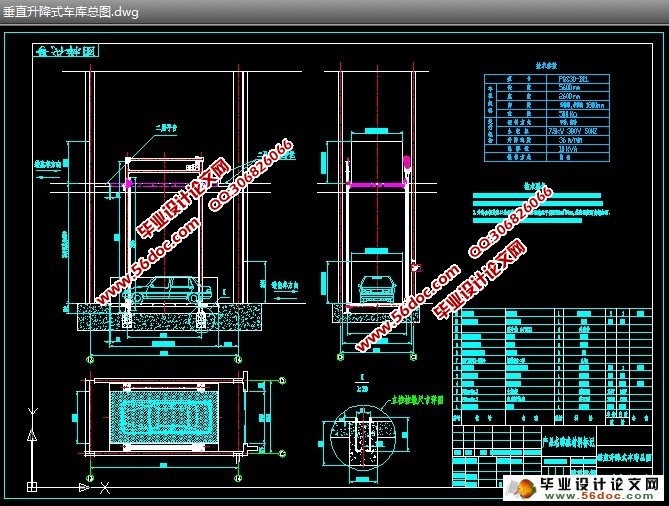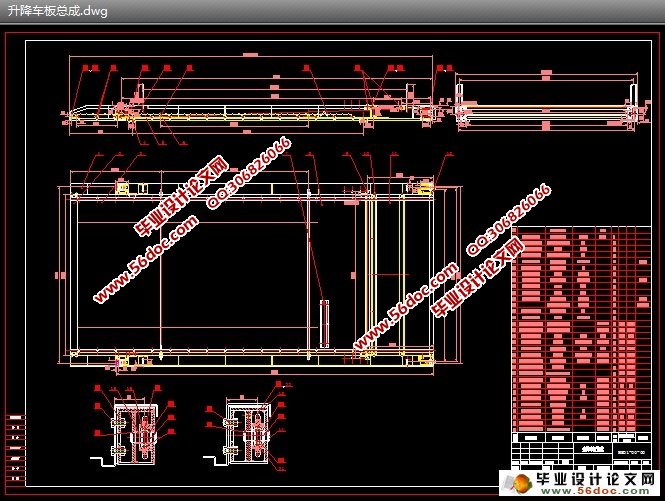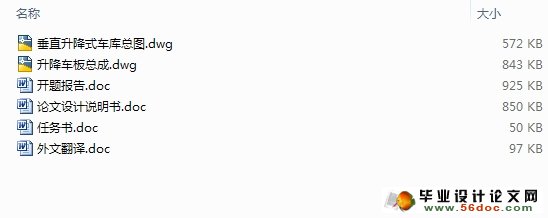升降式路边停车系统机械部分的设计
无需注册登录,支付后按照提示操作即可获取该资料.
升降式路边停车系统机械部分的设计(任务书,开题报告,外文翻译,论文设计说明书21600字,CAD图纸2张)
摘要:机械式停车设备是解决城市停车问题的一个有效解决手段,正被广泛应 用于各种场合。
论文对垂直升降式停车设备进行了认真的分析和研究。首先对垂直升降式停车设备的特点和概况做了简要的介绍,然后对垂直升降式立体车库的总体结构进行讨论研究。并选定链传动横移方式作为车库的存取形式,选定曳引驱动作为车库的升降驱动形式。
在完成总体框架设计之后,对车库的存取机构进行了详细研究。对停车位布置形式及其相关要求进行了分析,确定了符合国家标准要求的车库停车位和载车板的具体结构。讨论了存取机构设计功能要求及其实现方法,完成了链传动横移存取车装鬣的设计及其零部件的计算和校核。
升降系统是车库的重点组成部分。在升降系统中选用曳引驱动方式,并对曳引系统进行研究,分析影响曳引力的因素,并对曳引能力进行了计算校核。根据车库提升系统的工作特点,选用交流变频电机。针对车库运行中的不安全因素,选用了超速保护系统和撞底保护装置等策略来提高升降系统的可靠性。
关键词:垂直升降式立体停车设备、存取系统、结构强度分析和参数优化设计
Design of Machinery Parts for Lifting Mechanical Parking System
Abstract: Mechanical parking system,which is an effective way to solve the parking
problems in cities,is widely used in many situations.
This paper makes detail analysis and researches of the vertical lifting mechanical parking system.Firstly the general situation and characters of the vertical lifting mechanical parking system is briefly introduced.Secondly the total construction of system is discussed and researched.In the meandme,chain transportation fetching method is chosen to bc used in storage—retrieval structure of the parking system,as well as tractor—driven mode is chosen as lifting-driven mode.
After design of framework of the parking system is setup,researches on storage•retrieval structure are further.Configuration methods of parking unit and its relative requirements arc analyzed.And the detail structure of parking unit and parking board are confirmed coinciding to the GB standard.Functional requirements of storage—retrieval structure and its solving methods are discussed.The design of chain transportation-fetching machine is carried through.Calculations and verifications of parts in chain transportation—fetching machine ale also finished.
Lifting system is one of COre parts in parking system running.Tractor-driven method is used in lifting system and researches on it arc preceded.Influential factors of driving ability are analyzed and driving ability is calculated and verified.According to the working condition of lifting system,the analyses and research of lifting system is completed.According to the characters of the vertical lifting mechanical parking system,VVVF motor is selected.Contraposing unsafe factors in system running,over—speed protecting device and bottom—bumping protecting device are put into practice.
Keyword: Ertical Lifting Mechanical Parking System,Storage—retrieval System,Structure strength analysis,parameter optimization design
本论文研究的主要内容
论文在查阅大量资料的基础上,完成了一套实用有效的垂直升降式机械停车设备整体结构的设计工作,并在文中依次阐述停车设备中各个重要环节的设计过程。主要有以下内容:
l、垂直升降式立体停车设备总体结构的设计与研究
在对国内外同类产品进行分析的基础上,结合造价、技术难度以及用户需求等各个方面的指标,确定垂直升降式立体停车设备的总体布局、运行方式,然后进行存取车方式、提升系统、钢结构等各个组成部分的总体设计。
2、垂直升降式立体停车设备的存取机构设计
在分析比较的基础上,确定车库的存取车形式,然后由此详细设计停车位、载车板和存取机构。
3、直升降式立体停车设备的升降驱动机构研究
首先通过比较,选定曳引驱动方式作为整个车库的升降方式。然后设计升降平台、安全机构、配重系统等。并计算升降系统所需要的曳引能力、平衡配重的重量等。



目 录
1 绪论 ......................................................2
1.1课题的来源及研究的目的和意义...............................2
1.2机械式停车库...............................................3
1.3国内外研究状况.............................................4
1.4本论文研究的主要内容.......................................5
2 立体车库总体结构研究....................................6
2.1垂直升降式停车设备概况.....................................6
2.2升降驱动系统...............................................7
2.3车辆存取方式...............................................8
2.4垂直升降式立体停车系统的控制系统...........................10
3 车库的存取机构研究设计.................................12
3.1.1停车位布置形式及相关要求...............................12
3.1.2垂直升降式立体车库停车位结构...........................13
3.2 载车板结构................................................14
3.3.1存取机构功能要求及其实现...............................15
3.3.2存取机构的工作流程.....................................17
3.3.3存取机构中具体部件设计计算.............................18
4 立体车库升降机构的研究与设计.........................22
4.1升降机构的整体结构........................................22
4.2.1提升系统曳引力的分析计算...............................23
4.2.2曳引系统的受力分析.....................................26
4.2.3曳引电机及其调速方法选择...............................28
4.2.4曳引电机的容量选择.....................................29
4.2.5对重匹配研究...........................................30
5 总结与展望................................................32
5.1总结......................................................32
5.2展望......................................................32
参考文献........................................................33
致谢.............................................................34
